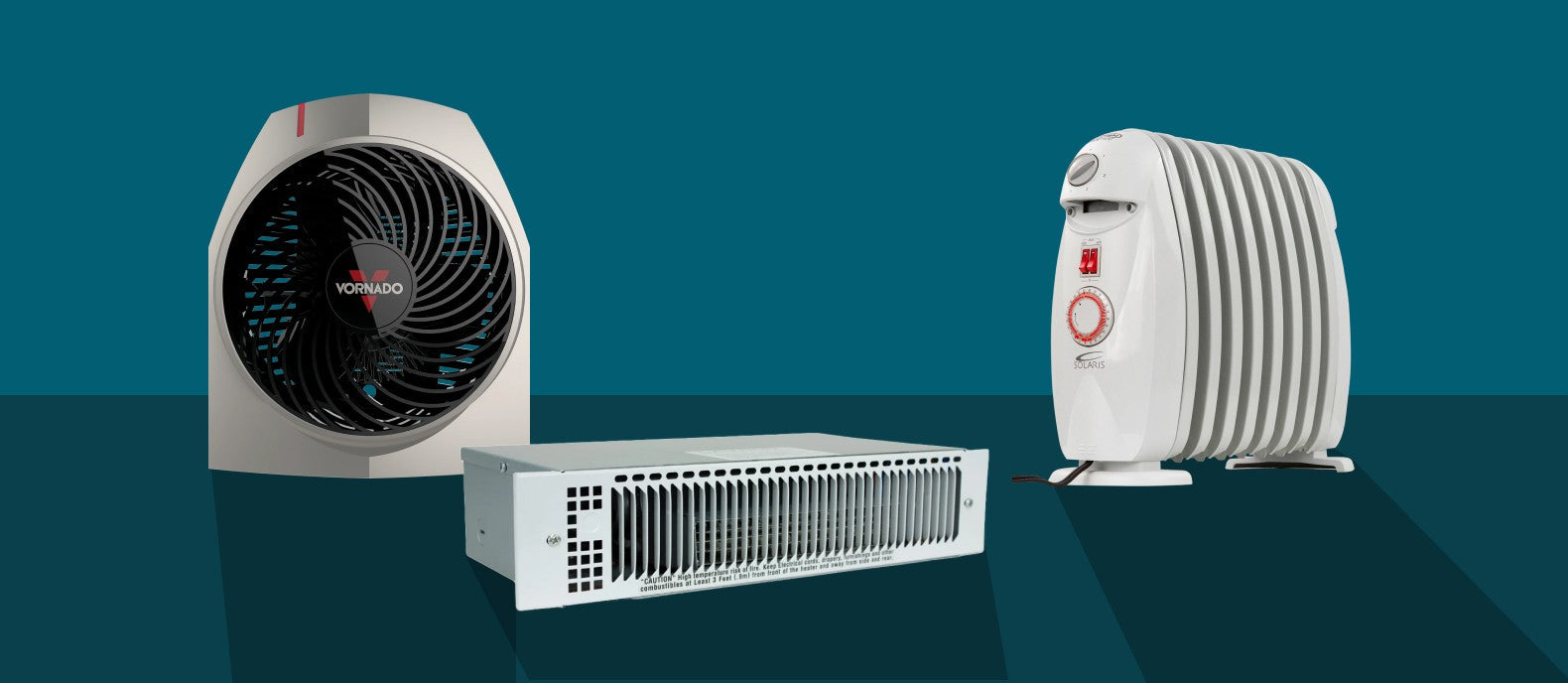Finding the right heater for your home should be easy, right? Well, as anyone who has endured a cold winter with the wrong heater knows, it often isn’t. Electric heaters can be noisy, smelly, and difficult to maneuver, and more often than not, they stick out like a sore thumb in your home.
But it doesn’t have to be that way because simple guidelines can help you decide the best heating source for your space.
What types of electric heaters are there?
According to our friends at King Electric, who have been building electric heater systems for over 60 years, most homeowners should consider five main heater types when looking for a new primary or supplemental heating system:
- Portable Space Heaters: For small to medium-sized spaces where temporary or supplemental heat is needed. Some spaces, like bathrooms, require a special unit to handle moisture and condensation.
- Wall Heaters: For small, medium, and large areas of the home, like bathrooms, kitchens, and hallways that lack floor space. Wall heaters are installed directly on interior walls and are a very good low-profile heating option.
- Cove Heaters: Cove heaters are mounted near the ceiling to provide direct radiant and convection heat to small and medium areas.
- Garage Heaters: Designed for large garages, workshops, basements, and crawl spaces, and typically provide significant heating power. They can be portable or installed on a wall or ceiling. They can also be used to heat equipment rooms or pump rooms.
- Outdoor Heaters: Electric outdoor heaters provide powerful heat to people and objects in medium-sized spaces. Most models are not designed for indoor use.
Installed Vs. Portable Heaters
For many spaces and situations, an electric heater is used as a secondary source of warmth when the primary heater doesn’t quite meet the space's needs. In those cases, a portable space heater is often the best choice.
Other times, wall, cove, and garage heaters must be physically installed in a space and connected to home or building power lines.
What factors about my home should I consider when choosing?
Before going out and buying any old heater that catches your eye, consider the space you plan to heat. These factors will determine whether your heating system is effective or economical:
- Type of Use/Space: Knowing how a space will be used will help you use the correct heating source for your needs. For example, a garage heater is likely too noisy for a bedroom or living room, and a wall heater isn’t powerful enough to heat a large garage or basement.
- Square Footage/Ceiling Height: A heater that is too large or too small for a space will end up wasting electricity. With standard 8-foot ceilings, experts recommend picking a heater that produces 10 watts of power for every square foot of space. Areas with higher ceilings will require more power.
- Heating Zone/Region: Every geographical region has different weather, so what heats a room in one zone might only work in similar places. Our friends at King Electric have a convenient heating zone map that will give you more information about your region.
- Voltage: Installing the incorrect voltage is very dangerous, so you’ll need to know if you need a 120V, 208V, or 240V system. Consult a licensed electrician if you aren’t sure what voltage you need.
- Breaker Size: A breaker panel large enough for your heater system will ensure it operates correctly. A too small breaker will trip and stop working, but a too-large panel may not trip correctly and could lead to dangerous situations.
What does installing an electric heater system involve?
Electric heaters are nearly always easy to install, requiring at most some light electrical work and simple in-wall installation. However, some models may require specialized professional installation. Consult your owner’s manual for manufacturer-recommended installation requirements.
What does it cost?
Electrical heating systems have some of the lowest startup costs, as they do not require ductwork or plumbed gas lines. Typical electric heaters cost between $100 and $700. Most electric heating systems are maintenance-free and rarely break down.
Are electric heater systems efficient or economical?
The Environmental Protection Agency (EPA) says electric heating systems are nearly 100% efficient because each room is typically controlled independently and heat is only active when the space is in use. Additionally, electric heaters produce no emissions, don’t burn anything for fuel, and release no gases or harmful fumes.
Why choose an electric system over a gas or ducted central heating system?
Here’s the best part — you don’t have to choose one option.
Because electric heating systems are typically supplemental rather than primary heating sources, you can introduce an electric heater anywhere in the home where the primary source doesn’t quite cover, like additions, basements, sunrooms, and garages.
In Summary
Electric heater systems come in various styles and offer an efficient, economical heating solution for many spaces and uses. Consider adding an electric heater to your home for supplemental heat in cold seasons.
For more information, tips, and resources about electric heater systems, visit www.sylvane.com or call 1-800-934-9194 to speak with an expert about your home heating needs.


